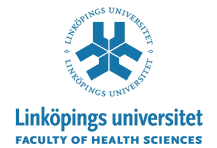 |
Visa svensk kursplan |
|
COURSE CATEGORY Single subject course MAIN FIELD OF STUDY Medical Biology SUBJECT AREA Medical Biology |
COURSE CODE | 8FA224 |
LEARNING OUTCOMES
By the end of the course the students will be able to:
Knowledge and understanding
- Comprehend and integrate the knowledge on molecular mechanisms involved in monogenic and polygenic traits to understand the genetic basis of diseases
- Describe the interplay between genetic and environmental factors
- Explain how concepts of genetic variation in populations are affecting evolution and population genetics
- Identify strategies and explain the theoretical basis of molecular genetics methodology to be able to identify disease genes
Competence and skills
- Demonstrate how calculation of genetic association and risk is performed
- Apply computer-based methods to be able to identify disease genes
- Practically perform and explain selected molecular genetics methodology for gene identification
Judgement and approach
- Interpret experimental results and evaluate genetic association studies and risk calculations
- Present, evaluate and communicate pros and cons of molecular genetics methods
- Summarise and assess scientific literature within medical genetics
- Disease gene identification.
- How environmental factors influence the genome and affects expression.
- Genetic variation in populations and its influence on genetic predisposition, including molecular/genetic epidemiology.
- Calculation of allele frequencies, associations and risk.
- Principles of major molecular genetic laboratory methods and interpretation of results, hands-on knowledge of selected methodology.
- Seminars on selected scientific papers
Specific: In this course, lectures, tutorial groups, seminars, demonstrations and laboratory work
are used.
Active participation in the compulsory parts is necessary to pass the course, and assessment of them is carried out continuously. Compulsory parts in this course are: tutorial groups, laboratory work, and seminars
EXAMINATION
Individual written examination.
Oral presentation of a literature assignment (group assignment with individual assessment).
Written report and oral presentation of laboratory work (group assignment with individual assessment).
SCOPE OF RE-EXAMINATION
The extent of a re−examination shall be similar to the regular examination.
CHANGE OF EXAMINERS
Students who have failed the course or part of the course twice are entitled to request another examiner for the following examination occasion, unless specific reasons are present.
REGISTRATION FOR EXAMINATION
The procedure for registration should be stated prior to the commencement of each course. In other respects, regulations concerning examination and examiners are applied in accordance with Linköping University policy.
Applicants must also have documented knowledge of English equivalent to Engelska B/Engelska 6; i.e. an internationally recognized test, e.g. TOEFL (minimum scores: Paper based 575 + TWE-score 4.5, and internet-based: Score of 20 (scale 0-30) in written test, total score of 90), IELTS, academic (minimum score: Overall mark of 6.5 and no section below 5.5), or equivalent.
The course is carried out in such a way that both men’s and women’s experience and knowledge is made visible and developed.
If the course is withdrawn, or is subject to major changes, examinations according to this course plan are normally offered on a total of three occasions within one year, one of them in close connection to the first examination.
|
||||||||||||||||||||||||||||||||||||||||||||||||||||||||||||||||||||||||||||||